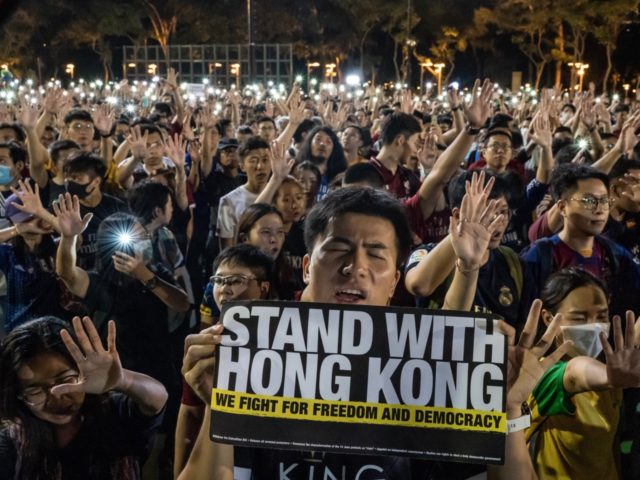Both the U.S. Senate and House of Representatives passed the Hong Kong Human Rights and Democracy Act through committee on Wednesday, paving the way for a floor vote and triggering an incendiary rant out of the Chinese Foreign Ministry on Thursday.
The act, if signed into law, would protect Hong Kong protesters’ ability to enter the United States if participating in peaceful protests damages their criminal records unjustly and requires the U.S. government to continuously assess China’s repression of the autonomous city, requiring sanctions if the Communist Party acts against it.
Hong Kong’s people have been protesting by the millions since June against increasingly bold attempts by the Communist Party of China (CPC) to violate the “One Country, Two Systems” policy that prevents Beijing from imposing its laws on the port city. Hong Kong’s government, appointed by Beijing, has responded to the protests with police brutality and mass arrests.
A bipartisan coalition of Senators and Congressmen, led by both Speaker of the House Nancy Pelosi (D-CA) and Senate Majority Leader Mitch McConnell (R-KY), have supported passing legislation to help defend human rights in Hong Kong in the face of the ongoing assault by China and its proxies in the government there. The Hong Kong Human Rights and Democracy Act will now head to a floor vote in both houses of Congress and, if passed, will reach President Donald Trump’s desk. Trump has not indicated that he would veto the bill, and used his time at the United Nations General Assembly on Tuesday to encourage the Hong Kong democracy movement.
The bill would ensure that protesters and pro-democracy leaders will not face extra hurdles in receiving American visas because they participated in the protests. It would also require the State Department and other relevant federal agencies to monitor the status of human rights in Hong Kong and issue travel alerts or sanctions, if necessary, should the Chinese regime expand its repression. It allows for sanctions not only on Chinese enterprises, but individual Chinese officials if found to commit human rights crimes.
As its passing appears imminent, the Chinese Foreign Ministry unleashed threats to meet America’s defense of human rights with “forceful fightback” and accusations of “vile” behavior on the part of the peaceful pro-democracy movement.
“In disregard of the vile behavior of Hong Kong’s radical and violent forces … the US Senate Foreign Affairs Committee and the House Foreign Affairs Committee insisted on reviewing and passing the above-mentioned Hong Kong-related bill,” ministry spokesman Geng Shuang lamented. “Such behavior is a gross interference in China’s domestic affairs, which fully reveals the ill intentions of some people in the United States to mess up Hong Kong and contain China’s development.”
“The passing of the bill by the US Senate and the House Foreign Affairs Committees will only embolden Hong Kong’s radical and violent forces, and further mess up Hong Kong,” he continued. “It will harm the interests of both China and the U.S. No one should underestimate China’s firm resolve and determination to safeguard its national sovereignty, security and development interests, to implement “one country, two systems”, and to safeguard Hong Kong’s prosperity and stability. Any attempt by the US to harm China’s interests will be met with forceful fightback.”
Geng ordered Congress to “immediately stop advancing the bill,” as he has several times in the past with no success.
The Global Times, a Chinese regime propaganda outlet, published a screed Thursday calling the bill “blatant interference in China’s domestic affairs,” citing “analysts.” The Times went on to quote anonymous “experts” who claimed that the bills had nothing to do with human rights and were instead designed to help give Washington leverage in its ongoing trade dispute with Beijing.
“All these bills should be viewed against the backdrop of the overall China-US confrontation and the trade war,” one anonymous “expert” said.
Geng’s tone did not deviate from his warnings last week against Congress for even considering the bill. The Foreign Ministry spokesman commanded the American Congress to legislate as Beijing would prefer.
“We strongly urge the U.S. to … stop its interference of any kind in Hong Kong affairs, stop advancing the bill, stop endorsing Hong Kong’s violent and radical forces and separatists, and stop abetting words and deeds that harm the prosperity of the special administrative region,” Geng said.
Protests are planned once again in Hong Kong this weekend, this time to observe the anniversary of the 2014 Umbrella Movement, the precursor to the current wave of protests. Pro-democracy activists have made four demands of their government: direct election of lawmakers, freedom for political prisoners, an end to calling protesters “rioters,” and an independent inquiry into police brutality. The Hong Kong government met a fifth demand – the withdrawal of a proposed law that would allow China to extradite anyone present in Hong Kong – this month, hoping it would bring an end to the protests.

COMMENTS
Please let us know if you're having issues with commenting.